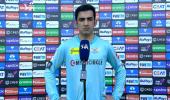It is a pity that he does not take his youth influencer role more seriously and align his brand endorsements more responsibly, notes Kanika Datta.

Commercials recur with maddening frequency during cricket matches on Indian TV. Broadcasts of the World Cup matches were no exception. Ads were shoved in at every conceivable interval.
Disney-Hotstar had a business case for this disorienting practice, given the humongous amounts they paid for the World Cup broadcasting rights.
The brand and ad choices of moneyed celebrity cricketers who starred in several of these ads and, therefore, appeared to viewers with distressingly high frequency, were less edifying.
The star of the World Cup commercial stakes was former captain M S Dhoni. With his captaincy record, looks and a huge youth following, Mr Dhoni is one of India's most bankable sports stars.
It is a pity that he does not take his youth influencer role more seriously and align his brand endorsements more responsibly.
Not choosing to star in a commercial for Lay's potato chips would have been a great start.
The proposition in the commercial was that kids would get to watch a World Cup match on TV in the company of Mr Dhoni only if they had Lay's crisps on hand.
The closing image is of Mr Dhoni and a bunch of teenagers happily scarfing down a packet of chips as they cheer India on.
Mr Dhoni's messaging in this commercial is harmful on many levels. First, in a country in which childhood obesity among middle class kids is an emerging health crisis, an encouragement by an influential sportsperson to eat junk food over a six-hour match is scarcely desirable.
Second, being non-biodegradable, the packaging for junk food poses an environmental hazard clogging drains, waterways, rivers and seas everywhere.
It's one thing for PepsiCo, owner of Lay's, to create such an ad to sell its products.
It's quite another for a youth icon, who is emulated by thousands of children in India, to agree to figure in it.
Mr Dhoni is known for his uber-fitness, which could not have been achieved by eating any form of junk food.
He is also extremely well-off since he is associated with the money-spinning Indian Premier League. That means he can afford to pick and choose the brands he endorses.
But his astonishing array of current endorsements covers Oreo and Snickers, both sugary, confectionary products, and Gulf Oil, a signature fossil fuel brand.
Sadly, fossil fuels play a big role in the endorsement life of Indian cricket team Coach Rahul Dravid, too.
He has chosen to hang his hard-earned Mr Dependable reputation on public sector oil major BPCL, for which he recently signed on as brand ambassador.
During the World Cup, he appeared endorsing, somewhat woodenly and sheepishly -- unlike Dhoni, he is not a natural actor -- BPCL's MAK Lubricants in a series of commercials.
It is a pity that Mr Dravid did not choose a less environmentally unfriendly product to match his sterling personal brand attributes of reliability and dependability.
Indian cricketers and most Indian sportspeople are still at the stage where endorsement earnings trump principles -- unlike, say, tennis greats Roger Federer, Rafael Nadal and Novak Djokovic, who are careful to align their endorsements with their image.
Nobody said much when Sachin Tendulkar and Mr Dhoni endorsed Pepsi.
Or when Jaspreet Bumrah, Ravindra Jadeja and Rohit Sharma appeared in an ad for Thums Up.
When star badminton player, the low-profile P Gopichand declined to endorse a cola brand because he thought aerated drinks were not healthy in 2002 he made headlines but little else.

Sparks of a debate began when Virat Kohli declined to endorse Pepsi in 2017 (but only after the contract ended) and cosmetic brand Fair & Lovely (renamed Glow & Lovely) because the brands did not fit his lifestyle choice.
It has not gone unnoticed, however, that Mr Kohli, one of the fittest cricketers in India today, endorses Royal Challenge's packaged drinking water, though everyone knows that the product is a surrogate for RC's alcohol products.
Badminton star P V Sindhu was initially discriminating in her endorsement choices, sticking to banking services or online education companies until this year when she became brand ambassador for Biryani By the Kilo.
This is hardly a suitable food for a sportsperson -- ask tennis player Sania Mirza, who confessed to struggling against the temptations of Hyderabadi biryani during her playing days.
Recently, Kapil Dev -- recall those appealingly bucolic endorsements of Palmolive shaving cream and Boost health drink -- said he would hesitate to endorse a cola brand.
He understands that the brands cricketers endorse matter because of the disproportionate popularity of the game and the influence they wield over young people.
True, they may have no choice in the matter when a soft drink or fossil fuel brand sponsors the entire team.
Perhaps they could look to three Muslim cricketers -- Hashim Amla (South Africa), Rashid Khan (Afghanistan) and Imad Hussain (Pakistan) -- who declined to wear the logos of alcohol brand sponsors on their jerseys because they clashed with their faith.
Mr Amla even agreed to pay a $500 fine for his refusal to do so.
Given the short professional life of a sportsperson, standing up for principles and beliefs could be the best long-term endorsement they can hope for.
Feature Presentation: Aslam Hunani/Rediff.com












